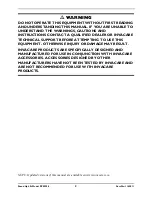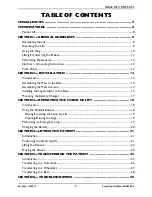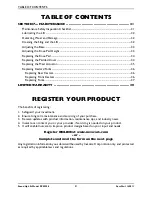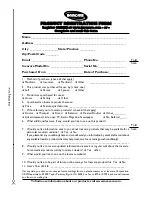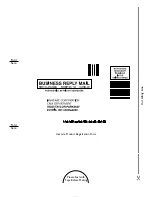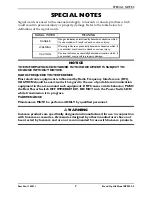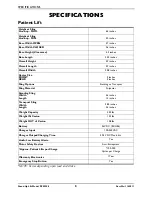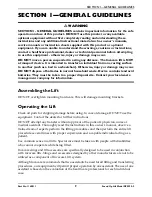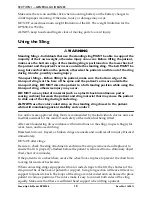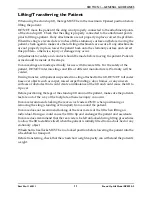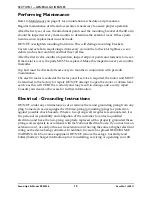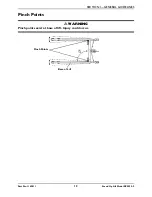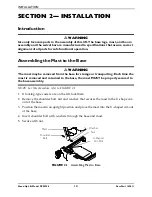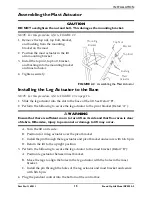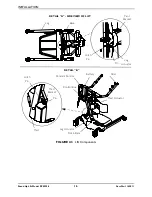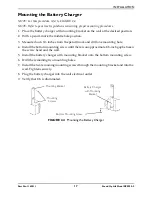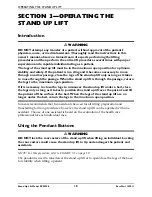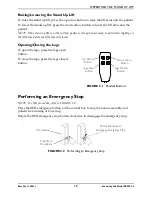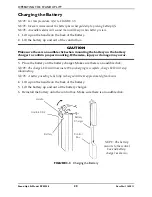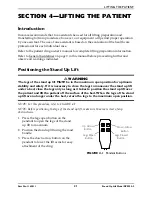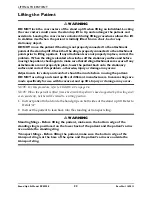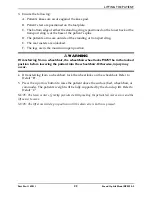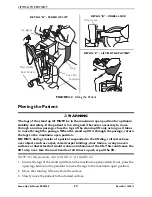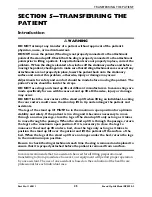
SECTION 1—GENERAL GUIDELINES
Stand Up Lift Model RPS350-2
10
Part No. 1145811
Make
sure
there
is
an
audible
click
when
mounting
battery
on
the
battery
charger
to
confirm
proper
mounting.
Otherwise,
injury
or
damage
may
occur.
DO
NOT
exceed
maximum
weight
limitation
of
the
lift.
The
weight
limitation
for
the
RPS350
‐
2
is
350
lbs.
ALWAYS
keep
hands
and
fingers
clear
of
moving
parts
to
avoid
injury.
Using the Sling
WARNING
Standing Slings - Individuals that use the standing sling MUST be able to support the
majority of their own weight, otherwise injury can occur. Before lifting the patient,
make sure the bottom edge of the standing sling is positioned on the lower back of
the patient and the patient's arms are outside the standing sling. The belt MUST be
snug, but comfortable on the patient, otherwise the patient can slide out of the sling
during transfer, possibly causing injury.
Transport Slings - Before lifting the patient, make sure the bottom edge of the
transport sling is at the base of the spine and the patient's arms are outside the
transport sling. DO NOT raise the patient to a full standing position while using the
transport sling, otherwise injury may occur.
DO NOT use any kind of material (such as a plastic back incontinence pad or
seating cushion) between the patient and sling material that may cause the patient
to slide out of the sling during transferring.
ALWAYS use the color coded strap on the standing sling closest to the patient
while still maintaining patient stability and comfort.
Use
an
Invacare
approved
sling
that
is
recommended
by
the
individual’s
doctor,
nurse
or
medical
assistant
for
the
comfort
and
safety
of
the
individual
being
lifted.
After
each
laundering
(in
accordance
with
instructions
on
the
sling),
inspect
sling(s)
for
wear,
tears,
and
loose
stitching.
Bleached,
torn,
cut,
frayed,
or
broken
slings
are
unsafe
and
could
result
in
injury.
Discard
immediately.
DO
NOT
alter
slings.
Be
sure
to
check
the
sling
attachments
each
time
the
sling
is
removed
and
replaced,
to
ensure
that
it
is
properly
attached
before
the
patient
is
removed
from
a
stationary
object
(bed,
chair
or
commode).
If
the
patient
is
in
a
wheelchair,
secure
the
wheel
locks
in
place
to
prevent
the
chair
from
moving
forwards
or
backwards.
When
connecting
slings
equipped
with
color
coded
straps
to
the
lift,
the
shortest
of
the
straps
must
be
at
the
back
of
patient
for
support.
Using
long
section
will
leave
little
or
no
support
for
patient
ʹ
s
back.
The
loops
of
the
sling
are
color
coded
and
can
be
used
to
place
patient
in
various
positions.
The
colors
make
it
easy
to
connect
both
sides
of
the
sling
equally.
Make
sure
that
there
is
sufficient
head
support
when
lifting
a
patient.


